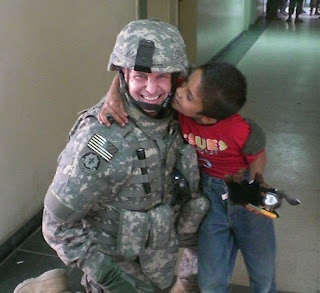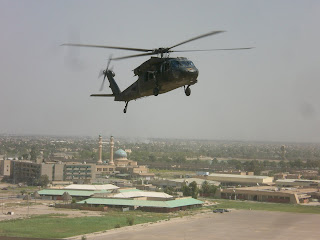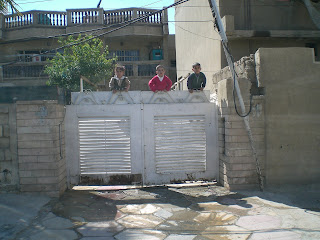A Blog from LTG Caldwell
16 years ago
I'm in the US Army and started this blog when I was deployed to Iraq. I've the privilege of being part of an orginization with the mission that has the potential of accomplishing something positively historical. After several months of being in Baghdad I stared this blog to share a couple of my own random thoughts/personal opinions, not directly related to current mission operations. Let me warn you upfront - I’m going to allow my thoughts to wander freely

 I have arrived in Germany…Kaiserslautern to be exact. I’m honored to be the new operations and intelligence (S-2/3) officer for the 202nd Military Police Group (CID). With an area of operation extending from Greenland to the east coast of Russia and the southern tip of Africa, the unit’s mission is to conduct criminal investigations of serious, sensitive or special interest matters, and criminal intelligence, logistics security, counter-drug, antiterrorism, force protection and protective services operations in support of Army and Department of Defense interests in order to prevent crime and protect Soldiers, civilians, family members, units and materiel.
I have arrived in Germany…Kaiserslautern to be exact. I’m honored to be the new operations and intelligence (S-2/3) officer for the 202nd Military Police Group (CID). With an area of operation extending from Greenland to the east coast of Russia and the southern tip of Africa, the unit’s mission is to conduct criminal investigations of serious, sensitive or special interest matters, and criminal intelligence, logistics security, counter-drug, antiterrorism, force protection and protective services operations in support of Army and Department of Defense interests in order to prevent crime and protect Soldiers, civilians, family members, units and materiel.
 ALERT:
ALERT: In the mainstream media, have you heard the recent good news from Iraq?
In the mainstream media, have you heard the recent good news from Iraq? The article on the shortage of majors in the Washington Post has received a lot of attention – unfortunately the issue in the article was slightly off point. The problem is not so much the number of majors leaving the service, but the number of officers leaving once they reach 20-years of service. I have posted a summary of my master’s thesis titled “Major Crisis: An Analysis of the Critical Shortage of US Army Officers in Year Groups 1991-1997” (pp125) to help clarify the situation.
The article on the shortage of majors in the Washington Post has received a lot of attention – unfortunately the issue in the article was slightly off point. The problem is not so much the number of majors leaving the service, but the number of officers leaving once they reach 20-years of service. I have posted a summary of my master’s thesis titled “Major Crisis: An Analysis of the Critical Shortage of US Army Officers in Year Groups 1991-1997” (pp125) to help clarify the situation. I have been given my next assignment. I will be at the Pentagon no later than the middle of January, 2009 working on the Quadrennial Defense Review. The Quadrennial Defense Review (QDR) charts the way ahead for the military over the next 20 years as it confronts current and future challenges and continues its transformation for the 21st century.
I have been given my next assignment. I will be at the Pentagon no later than the middle of January, 2009 working on the Quadrennial Defense Review. The Quadrennial Defense Review (QDR) charts the way ahead for the military over the next 20 years as it confronts current and future challenges and continues its transformation for the 21st century. After I saw first hand how the Iraqi soccer team was able to help bring together this new democratic nation last, I thought it was distressing when I learned that Iraq could not participate in the Olympic being held in CHINA… is this not ironic?
After I saw first hand how the Iraqi soccer team was able to help bring together this new democratic nation last, I thought it was distressing when I learned that Iraq could not participate in the Olympic being held in CHINA… is this not ironic? The truth is out there… but not from the liberal media. The blogs have it:
The truth is out there… but not from the liberal media. The blogs have it: There is a Major Crisis in the US Army that receiving very little attention, but is having a critical affect on the military and its ability to continue the high operational tempo: there is a 17% shortage of US Army active duty majors. Half of the specialty branches are so undersized majors that the branches would be considered not ready for combat using the US Army Unit Status Reporting system. For example, the transportation branch is short 50% of requirements for majors with 92% of these officers planning on leaving after they reach 21 years of service, or less.
There is a Major Crisis in the US Army that receiving very little attention, but is having a critical affect on the military and its ability to continue the high operational tempo: there is a 17% shortage of US Army active duty majors. Half of the specialty branches are so undersized majors that the branches would be considered not ready for combat using the US Army Unit Status Reporting system. For example, the transportation branch is short 50% of requirements for majors with 92% of these officers planning on leaving after they reach 21 years of service, or less. It has been four months now since my return from Iraq. As I look back on the last few months, my time in Iraq seems so many years ago… almost a different lifetime. I get the same feeling now as I got when I had returned from Desert Storm… remembering is like recalling an old movie; an actor I saw, not really something I did. I guess the mind has its own way with dealing with memories.
It has been four months now since my return from Iraq. As I look back on the last few months, my time in Iraq seems so many years ago… almost a different lifetime. I get the same feeling now as I got when I had returned from Desert Storm… remembering is like recalling an old movie; an actor I saw, not really something I did. I guess the mind has its own way with dealing with memories. 15 DEC 07: I have been in Baghdad for 432 days – IT IS MY FINAL DAY.
15 DEC 07: I have been in Baghdad for 432 days – IT IS MY FINAL DAY. Geraldo Rivera has had a great line of reports from Iraq recently – I’ve always seen him as a bit too much into “sensational” journalism… but he is be the only national reporter brave enough to get out in the streets and tell the great story of the successes in Iraq. Just six months ago, there was not one national media reporter or one democrat that gave us an ounce of hope. There is more to being proud of our Soldiers than just simple “we support the troops”; the pride should be in the substantial achievements within all the sacrifices.
Geraldo Rivera has had a great line of reports from Iraq recently – I’ve always seen him as a bit too much into “sensational” journalism… but he is be the only national reporter brave enough to get out in the streets and tell the great story of the successes in Iraq. Just six months ago, there was not one national media reporter or one democrat that gave us an ounce of hope. There is more to being proud of our Soldiers than just simple “we support the troops”; the pride should be in the substantial achievements within all the sacrifices. Cousin Betsy and Boy Scout Troop 969 (VA) sent me a couple more boxes of school supplies and Beanie Babies for Iraqi children. I was able to get the boxes to a different orphanage this time; one that was made infamous by Lara Logan of CBS/60 minutes. Conditions have improved there – but some of the children are still really bad off (two have died).
Cousin Betsy and Boy Scout Troop 969 (VA) sent me a couple more boxes of school supplies and Beanie Babies for Iraqi children. I was able to get the boxes to a different orphanage this time; one that was made infamous by Lara Logan of CBS/60 minutes. Conditions have improved there – but some of the children are still really bad off (two have died). I think America is the only country in world history that reverse-propagandizes itself, magnifying its setbacks and ignoring its successes. The media of today would of had us out of WWII months after D-Day after the set-backs progressing past the beachhead in the hedges. What would our world be like today...
I think America is the only country in world history that reverse-propagandizes itself, magnifying its setbacks and ignoring its successes. The media of today would of had us out of WWII months after D-Day after the set-backs progressing past the beachhead in the hedges. What would our world be like today... I am now here for my second Veterans’ Day in a row; ironic how the government gets this whole weekend off…
I am now here for my second Veterans’ Day in a row; ironic how the government gets this whole weekend off… Today and yesterday I passed along some happiness from America to Iraq.
Today and yesterday I passed along some happiness from America to Iraq. I like Zoos… Everywhere I have visited, I have made the point to visit their zoo.
I like Zoos… Everywhere I have visited, I have made the point to visit their zoo. Not much new to report – by nothing new I mean that:
Not much new to report – by nothing new I mean that: Stability and security depends on the knowledge that if you do wrong, that you will be caught, and there will be a negative impact on you directly. This works (or doesn’t work) on the local level just as it works (or doesn’t work) on the global scale. When a rouge nation abuses its power; ignores its responsibility to the citizens; and harms its neighbors there must be known, dependable, and swift consequences.
Stability and security depends on the knowledge that if you do wrong, that you will be caught, and there will be a negative impact on you directly. This works (or doesn’t work) on the local level just as it works (or doesn’t work) on the global scale. When a rouge nation abuses its power; ignores its responsibility to the citizens; and harms its neighbors there must be known, dependable, and swift consequences. I have said it before – and now it is visible to most… Iraq has hit the tipping point and is now moving quicker and faster toward a more secure and stable country. This is an exciting time for Iraq and success in our mission, even when many said we were failing. Granted, most of the cries for surrender came from politicians, only interested in getting votes - not in doing the right thing; or by our media, hell bent on giving doom and gloom stories because it sells better.
I have said it before – and now it is visible to most… Iraq has hit the tipping point and is now moving quicker and faster toward a more secure and stable country. This is an exciting time for Iraq and success in our mission, even when many said we were failing. Granted, most of the cries for surrender came from politicians, only interested in getting votes - not in doing the right thing; or by our media, hell bent on giving doom and gloom stories because it sells better. There will always be war…
There will always be war… I have read over and over again recently about how we have made numerous military gains here in Iraq, but slight advancement on the political side. What is missed in all of this is the massive amount of Iraqi political pressure that is being placed on the militias and Iran to stop the hostilities.
I have read over and over again recently about how we have made numerous military gains here in Iraq, but slight advancement on the political side. What is missed in all of this is the massive amount of Iraqi political pressure that is being placed on the militias and Iran to stop the hostilities. Do you remember how you felt on 9/11? The world changed.
Do you remember how you felt on 9/11? The world changed. Today marks 100 days to go... I would have been going home this month (one year), but the surge and the extension will now have me here until around Christmas.
Today marks 100 days to go... I would have been going home this month (one year), but the surge and the extension will now have me here until around Christmas. I have been asked what could be done to support the troops – directly.
I have been asked what could be done to support the troops – directly. ASU- 34
ASU- 34 I have always been a bit uncomfortable when asked to stand up and singled out at a major show or sporting event to honor those who are or have been in the service (but I always stand up). Not that I’m not proud of what I do – but because standing up brings too much attention directly to me, when the true honor is to those who over the hundreds of years have give there life before I was even born. We have something very special, but it did not come easy, nor by those content to just complain and take no real action.
I have always been a bit uncomfortable when asked to stand up and singled out at a major show or sporting event to honor those who are or have been in the service (but I always stand up). Not that I’m not proud of what I do – but because standing up brings too much attention directly to me, when the true honor is to those who over the hundreds of years have give there life before I was even born. We have something very special, but it did not come easy, nor by those content to just complain and take no real action.


 There has been a positive tipping point in this war on so many fronts:
There has been a positive tipping point in this war on so many fronts: I've a family reunion this weekend – I’ll of course miss it, as I have often recently because of my job; but I still have great memories of the ones I did make:
I've a family reunion this weekend – I’ll of course miss it, as I have often recently because of my job; but I still have great memories of the ones I did make:
 Americans are still concerned with finding ways to define “victory” in Iraq, yet virtually the entire world already perceives the US as having decisively lost. We probably cannot entirely reverse these attitudes, however, we may be able to improve them over time. It seems likely that the US will ultimately be judged far more by how it leaves Iraq, and what it leaves behind, than how it entered Iraq. Our global image, and how we see ourselves, is at stake.
Americans are still concerned with finding ways to define “victory” in Iraq, yet virtually the entire world already perceives the US as having decisively lost. We probably cannot entirely reverse these attitudes, however, we may be able to improve them over time. It seems likely that the US will ultimately be judged far more by how it leaves Iraq, and what it leaves behind, than how it entered Iraq. Our global image, and how we see ourselves, is at stake. 300 days here; 134 to go…
300 days here; 134 to go…